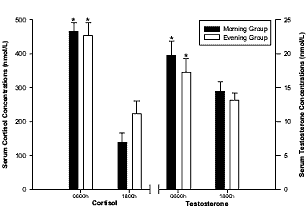|
Definition: "An ergogenic aid is any substance or phenomenon that enhances performance "
|
|
||||||||
10.02.2019 |
|
|
Strength training in the morning is just as effective as strength training in the evening
It does not matter whether you work out with weights in the morning or in the evening. Though the body's biological clock of the body makes the muscles react better to strength traininglater in the day, this effect is so small that most athletes do not have to take it into account. Australian sports scientists at Victoria University write this in a meta-study published in Chronobiology International.
Study
Results
Conversely, if the subjects had worked out in the evening, they could develop a bit more strength in the evening than subjects who had worked out in the morning. This difference was slightly greater than the above, but still small.
Strengh athletes who want to become stronger can just as well work out in the morning as in the evening, the researchers conclude. This also applies to muscle building, they note. The data on muscle mass are rather poor, so they were not able to enlighten their readers with fancy figures.
Conclusion
"By contrast, training in the evening maintains the general differences in the strength expression across different times of the day."
"Training both in the morning and in the evening hours may produce similar improvements in strength regardless of the time at which the testing sessions are conducted. This is likely given that training in the morning and in the evening hours also improves strength when assessed in a specific and in a non-training specific time of day."
"Finally, increases in muscle hypertrophy are similar."
"Therefore, individuals interested in participating in resistance exercise should choose the time of the day for training that will ultimately facilitate long-term training adherence."
"For sports coaches and trainers, it is interesting to note that after a period of training in the morning hours, strength levels in these hours appear to become similar to those observed in the evening. However, when training in the evening hours, the general difference in strength between morning and evening hours does not change."
"These findings may be of considerable value from a practical standpoint as they highlight that if the specific time of competition for an athlete is known in advance, at least some of the training sessions should be organized so that they coincide with the competition time of day (to ensure a positive time-specific performance)."
Source:
More: Archives:
|
|
||||||||||||||||




